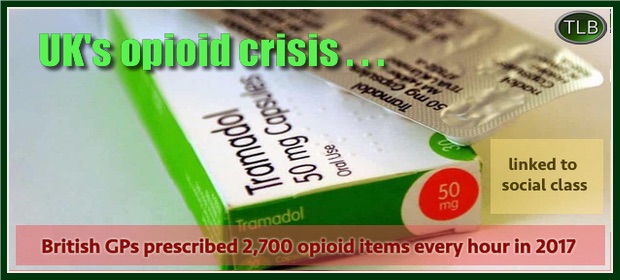
ER Editor: This brief BBC report from a year ago titled NHS accused of fuelling rise in opioid addiction reveals that “GPs in England prescribed 23.8 million opioid-based painkillers in 2017, the equivalent of 2,700 items every hour”.
********
Rise in UK opioid prescriptions contributes to surge in overdose fatalities
MARGOT MILLER
A study by the British Journal of General Practice reveals an alarming rise in the number of National Health Service (NHS) prescriptions for opioids issued by General Practitioners (GPs). This is greatest in the more deprived areas of the country.
“Patterns of regional variation of opioid prescribing in primary care in England: a retrospective observational study” provides further proof that life expectancy, health, and access to health care is very much a function of the most fundamental division of society under capitalism—class. Poverty and the stresses that it brings is a major killer.
Opioids are prescribed for pain relief, especially acute pain in cancer and end-of-life care, or for short-term use after an injury or surgery. The most commonly known are morphine, fentanyl, oxycodone, tramadol and codeine. Fentanyl is so powerful it is used to knock out elephants and is also used in executions. Six or seven grains of the substance can prove lethal.
The consequences of long-term use of opioids can be devastating, often leading to death.
The British Journal of General Practice records that “[m]ore opioids were prescribed in the north than in the south of England, and more opioids were prescribed in areas of greater social deprivation.”
The 10 highest areas for GP opioid prescribing are NHS Blackpool Clinical Commissioning Group (CCG), and CCGs in St Helens, Lincolnshire East, Knowsley, Barnsley, Corby, Halton, Great Yarmouth and  Waveney, Doncaster and South Tees—all areas with the highest concentrations of deprivation. Nine out of 10 of these areas are in the largely de-industrialised north of England, which is blighted by poverty.
Waveney, Doncaster and South Tees—all areas with the highest concentrations of deprivation. Nine out of 10 of these areas are in the largely de-industrialised north of England, which is blighted by poverty.
Dr Roger Knaggs, associate professor in clinical pharmacy practice at the University of Nottingham, noted that these drugs are not suitable for relieving long-term chronic pain, such as back pain, arthritis and nerve pain. Their efficacy decreases with use over time; they come with side effects and are highly addictive.
One of the authors of the opioid study, Luke Mordecai, a pain research fellow at University College London Hospital, has called for a national register to monitor patients on the equivalent of more than 120mg of morphine a day. “There should be a national database to keep track of these people,” he said. “There is very high morbidity and mortality [among them], a lot of it avoidable.”
International attention has turned to the dangerous consequences of the increasing use or misuse of these powerful drugs, most catastrophically in the United States. In 2017, US deaths from drug overdoses reached 72,000—6,000 more than the previous year-on increase of 9.5 percent. Of these deaths 49,000 were associated with opioids, up more than 9,000 from 2016. Pharmaceutical companies have made bonanza profits by selling medications whose addictive properties they have previously denied.
A study by the Sunday Times found a correlation between areas with higher prescribing of opioids and higher death rates. Mortality in the northeast at 6 per 100,000 is double the national average of 3 per 100,000. Wales comes next (5 per 100,000), followed by the northwest (5 per 100,000) and Yorkshire and Humber (4 per 100,000). London has the lowest mortality figures, with 2 per 100,000.
Figures for 2017, the latest available, show there were three times more opioid related deaths in the North East and North West (512) in comparison to London (159), with the equivalent population size. Swansea in Wales has the highest death rate from opioids in England and Wales. According to the Office for National Statistics, 16 people per 100,000 died from opioids in Swansea in 2017.
Opioid addiction is becoming a problem among those over 60. The number in this age group undergoing treatment for opioid addiction has risen a staggering 300 percent in the last decade. The Sunday Times revealed that in 2017-18, 2,520 needed treatment for addiction.
While not as acute as in the US, the increased prescribing of opioids points to a mounting social crisis, marked by a woefully inadequate health service starved of funds by years of austerity since the global financial crash of 2008.
NHS Improvement, the regulator of the country’s NHS trusts, calculated that the combined NHS trusts are carrying a total deficit of £4.3 billion. Research and development into new treatments is abysmally low, both comparatively and in real terms. The UK Public Spending website projects a measly £1.9 billion will be spent on research and development in 2019, compared to £48.3 billion on defence.
Eytan Alexander, chief executive of UK Addiction Treatment, told the BBC:
“GPs must accept responsibility for consistently overprescribing … A rate of 79 packs [prescriptions] per minute is just not acceptable. It is vital that alternatives are provided.”
The problem is that GPs treating patients in distress have little alternative than to prescribe something that is potentially harmful if used long-term. Research into providing effective pain relief solutions with minimal side effects is very low on the priority list of any government, Conservative or Labour.
Alternative holistic treatments to long-term pain management, while available privately, are not widely on offer in the cash-starved NHS. Only 40 percent of NHS pain consultants can adopt a multi-disciplinary approach to pain management, including a psychologist and physiotherapist.
That the working class is bearing the brunt of this crisis is no surprise. Manual workers are more likely to suffer muscular-skeletal injuries due to the nature of the work they do. The rate for men and women reporting chronic pain is much higher in the lowest rather than in the upper income quartile.
Another indication of the deepening social crisis in the UK is the increasing uptake of antidepressants. Rates of antidepressant use across all ages increased by 5 percent between 2015-16 and 2017-18, according to figures released under the Freedom of Information Act.
The British Journal of General Practice concludes from its findings that “Questions of equality of care arise from higher prescription rates in the north of England and in areas of greater social deprivation.”
The increase in opioid use corresponds to the changing nature of the work environment. Speed-up is the order of the day. In companies like Amazon, workers are encouraged to compete to achieve backbreaking targets, on pain of dismissal, expedited by temporary contracts. A higher likelihood of work-related injury follows.
The culture of work has been transformed. Wages have been driven down, and the right to sickness benefits eroded, expressed by the fact that sickness is routinely treated as a disciplinary matter.
Many workers are now referred to Human Resources after a period of sickness and must attend a back-to-work review when they return to the job. Disciplinary proceedings kick in after a certain number of absences, regardless of a doctor’s sick note. The pressure is on to work through injuries that need time and rest to heal. Workers resort to aggressive pain killers to enable them to continue working out of fear of the economic consequences of missed work.
Responsibility for this assault on wages and conditions must be laid at the door of the trade unions. They actively collaborate with employers, pitting workers in the UK against those in other countries, to make UK industry more competitive on the world market and an attractive cheap labour proposition for foreign investment.
The struggle for equality in health and all areas of social life is bound up with the fight for socialism, which means the working class taking hold of society’s wealth and resources—at present being squandered by a tiny, parasitic minority—to use for the benefit of all.
************
Original article
ER recommends other articles by WSWS





A pharmaceutical company in America bribed American doctors to use opioids, telling doctors that opioids were ‘non-additive’ when in fact they knew the opposite was true.
They bribed doctors with vacations, paid off business loans, even gave some doctors expensive ‘lap dances’ at men’s clubs to push their poison on the unsuspecting American public. THere are several links on the Web to verify my statements.
The only good news is that opioid use is declining where medical “weed” is becoming available in America…but greed os the only reason it occurred here in the first place.